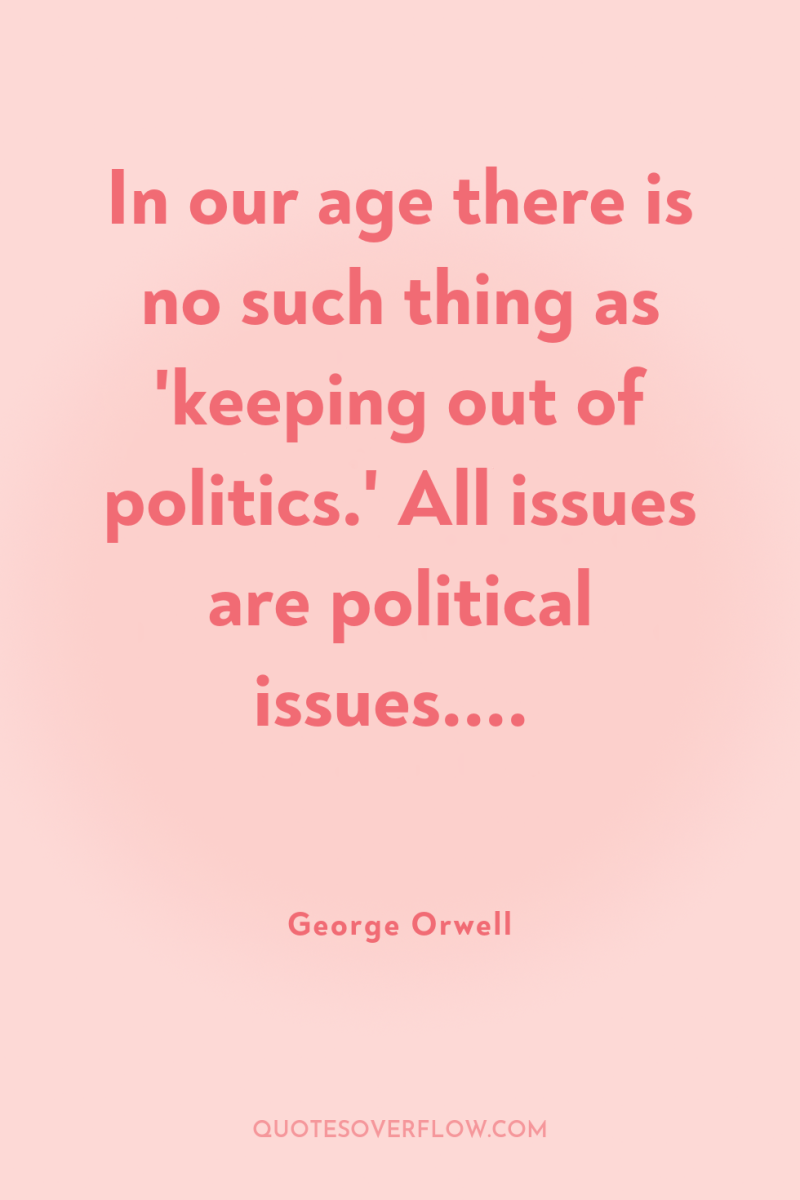
1
All the papers that matter live off their advertisements, and the advertisers exercise an indirect censorship over news.George Orwell
2
All writers are vain, selfish, and lazy, and at the very bottom of their motives there lies a mystery. Writing a book is a horrible, exhausting struggle, like a long bout of some painful illness. One would never undertake such a thing if one were not driven on by some demon whom one can neither resist nor understand. For all one knows that demon is simply the same instinct that makes a baby squall for attention. And yet it is also true that one can write nothing readable unless one constantly struggles to efface one's own personality. Good prose is like a windowpane.George Orwell
3
Here one comes upon an all-important English trait: the respect for constituitionalism and legality, the belief in 'the law' as something above the state and above the individual, something which is cruel and stupid, of course, but at any rate incorruptible. It is not that anyone imagines the law to be just. Everyone knows that there is one law for the rich and another for the poor. But no one accepts the implications of this, everyone takes for granted that the law, such as it is, will be respected, and feels a sense of outrage when it is not. Remarks like 'They can't run me in; I haven't done anything wrong', or 'They can't do that; it's against the law', are part of the atmosphere of England. The professed enemies of society have this feeling as strongly as anyone else. One sees it in prison-books like Wilfred Macartney's Walls Have Mouths or Jim Phelan's Jail Journey, in the solemn idiocies that take places at the trials of conscientious objectors, in letters to the papers from eminent Marxist professors, pointing out that this or that is a 'miscarriage of British justice'. Everyone believes in his heart that the law can be, ought to be, and, on the whole, will be impartially administered. The totalitarian idea that there is no such thing as law, there is only power, has never taken root. Even the intelligentsia have only accepted it in theory. An illusion can become a half-truth, a mask can alter the expression of a face. The familiar arguments to the effect that democracy is 'just the same as' or 'just as bad as' totalitarianism never take account of this fact. All such arguments boil down to saying that half a loaf is the same as no bread. In England such concepts as justice, liberty and objective truth are still believed in. They may be illusions, but they are powerful illusions. The belief in them influences conduct, national life is different because of them. In proof of which, look about you. Where are the rubber truncheons, where is the caster oil? The sword is still in the scabbard, and while it stays corruption cannot go beyond a certain point. The English electoral system, for instance, is an all but open fraud. In a dozen obvious ways it is gerrymandered in the interest of the moneyed class. But until some deep change has occurred in the public mind, it cannot become completely corrupt. You do not arrive at the polling booth to find men with revolvers telling you which way to vote, nor are the votes miscounted, nor is there any direct bribery. Even hypocrisy is powerful safeguard. The hanging judge, that evil old man in scarlet robe and horse-hair wig, whom nothing short of dynamite will ever teach what century he is living in, but who will at any rate interpret the law according to the books and will in no circumstances take a money bribe, is one of the symbolic figures of England. He is a symbol of the strange mixture of reality and illusion, democracy and privilege, humbug and decency, the subtle network of compromises, by which the nation keeps itself in its familiar shape. .George Orwell

4
In our age there is no such thing as 'keeping out of politics.' All issues are political issues....George Orwell
5
England is not the jewelled isle of Shakespeare's much-quoted message, nor is it the inferno depicted by Dr Goebbels. More than either it resembles a family, a rather stuffy Victorian family, with not many black sheep in it but with all its cupboards bursting with skeletons. It has rich relations who have to be kow-towed to and poor relations who are horribly sat upon, and there is a deep conspiracy of silence about the source of the family income. It is a family in which the young are generally thwarted and most of the power is in the hands of irresponsible uncles and bedridden aunts. Still, it is a family. It has its private language and its common memories, and at the approach of an enemy it closes its ranks. A family with the wrong members in control - that, perhaps is as near as one can come to describing England in a phrase. .George Orwell
6
I knew that I had a facility with words and a power of facing unpleasant facts, and I felt that this created a sort of private world in which I could get my own back for my failure in everyday life.George Orwell
7
An illusion can become a half-truth, a mask can alter the expression of a face.George Orwell
8
It is bound to be a failure, every book is a failure, but I do know with some clarity what kind of book I want to write.George Orwell
9
I do not think one can assess a writer's motives without knowing something of his early development. His subject matter will be determined by the age he lives in.. but before he ever begins to write he will have acquired an emotional attitude from which he will never completely escape. It is his job, no doubt, to discipline his temperament and avoid getting stuck at some immature stage, in some perverse mood; but if he escapes from his early influences altogether, he will have killed his impulse to write. .George Orwell
10
Aesthetic enthusiasm. Perception of beauty in the external world, or, on the other hand, in words and their right arrangement. Pleasure in the impact of one sound on another, in the firmness of good prose or the rhythm of a good story. Desire to share an experience which one feels is valuable and ought not to be missed. The aesthetic motive is very feeble in a lot of writers, but even a pamphleteer or writer of textbooks will have pet words and phrases which appeal to him for non-utilitarian reasons; or he may feel strongly about typography, width of margins, etc. Above the level of a railway guide, no book is quite free from aesthetic considerations.George Orwell
11
England is the most class-ridden country under the sun. It is a land of snobbery and privilege, ruled largely by the old and silly.George Orwell
12
If you have no money, men won't care for you, women won't love you; won't, that is, care for you or love you the last little bit that matters.George Orwell